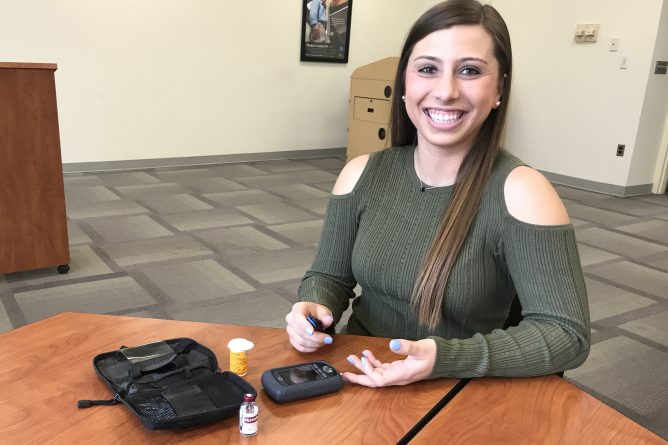Webster’s Dictionary defines a disability as a, “physical, mental, cognitive, or developmental condition that impairs, interferes with, or limits a person’s ability to engage in certain tasks or actions or participate in typical daily activities and interactions.”
While some disabilities are visible, not all disabilities can be seen—that is the case for students like Erika Cavallo.
A senior majoring in business administration with a marketing concentration, Cavallo was diagnosed with Type 1 Diabetes on April 3, 2015—a date she will never forget, because it changed her life forever.
Type I Diabetes is often called the “invisible disease” because its effects on the body can’t be seen and its symptoms aren’t always noticeable to others. Daily activities that may be routine to some people can be challenging for diabetics, including Cavallo, who never knows what the day will bring.
“If I had given up when I got sick, I wouldn’t be where I am today. This disease makes me who I am.”
With Type 1 diabetes, the body does not produce insulin, which is needed for glucose, which is needed for energy. Cavallo wears a wireless insulin pump on her arm called an Omnipod and a glucose monitor on her other arm called a Dexcom. Together, these devices help her get through the day a bit easier. Sometimes though, her insulin pump fails, and she doesn’t get enough insulin, causing her sugar to be higher or lower. Sometimes she gives herself too much insulin, causing a life threatening low, and she passes out.
Her entire day revolves around what her sugar is, and sometimes because of her sugar level, she is unable to do the things she wants to do. All day every day, she monitors how many carbohydrates she consumes. Over time, she has learned what things she can and can’t eat, but sometimes even when she does everything right, her sugar escalates or de-escalates at random.
However, no matter how Cavallo is feeling physically, she pushes through and doesn’t complain.
“Towson University and the College of Business and Economics have been amazing when it comes to accommodating my disease,” Cavallo said.
Towson University’s Disability Support Services (DSS) helps Cavallo provide documentation to her professors each semester, informing them of the accommodations she must have in the classroom at all times. If for some reason these accommodations are not followed, DSS will step in and assist, ensuring Cavallo receives what she needs. As a diabetic, Cavallo has rights. Laws were put in place to accommodate and help when needed. She is allowed to have food and drinks on her at all times in case of emergency. She also can’t be discriminated against in the workplace. She is allowed to do anything and everything that everyone else does.
Cavallo hasn’t let her challenges stop her from pursuing a future career in sales. She recently accepted an outside sales position with ADP. The interview process was extremely hard and consisted of five rounds of interviews. Throughout the interviews, her disability came up several times during conversation. She used it as an opportunity to demonstrate to everyone in the room how hard she has worked to get where she is today.
“If I had given up when I got sick, I wouldn’t be where I am today,” she said. “This disease makes me who I am.”
Cavallo wants everyone to know that it’s important not to judge people with disabilities.
“We might be different, but we are able to do anything that anyone else can do. We just do it in a different way,” she said. “Our disabilities don’t fully define us. We are real people with real feelings, and we deserve respect just like everyone else does. You never know what someone is going through on the inside, so you should always be kind to people.”
For more information about diabetes, visit: http://www.diabetes.org/
By Lisa Simmons, Business Excellence
This story is a part of the college’s monthly CBE Celebrates Diversity Series, which highlights student, faculty and staff stories from our diverse community.


